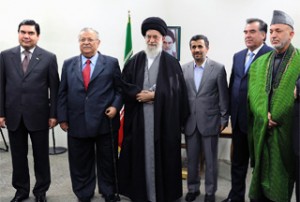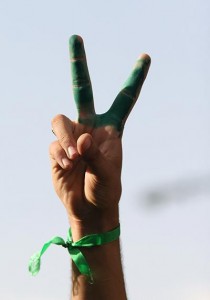
2150 GMT: The website of the late Grand Ayatollah Montazeri claims that
30 people were arrested at the funeral of his wife, MahSoltan Rabani (see 1730 GMT).
1815 GMT: Sanctions Division. Turkish Prime Minister Recep Tayyip Erdogan
has again rejected new sanctions on Iran. In an interview with
Spiegel, ahead of a visit to Turkey by German Chancellor Angela Merkel, Erdogan maintained, "We must first try to find a diplomatic solution. "What we need here is diplomacy, and then more diplomacy....Everything else threatens world peace."
NEW Iran’s Nukes: The Dangerous News of The New York Times
The Latest from Iran (27 March): Rumours
1745 GMT: Denial of a Rumour. Yesterday we reported the story racing around the Internet that the Revolutionary Guard was laundering money through Dubai and Bahrain, using Ali Jannati, the son of Guardian Council leader Ahmad Jannati, and putting the funds in a Swiss bank.
We would have left it at that, but
Press TV now reports:
Iran has denied reports that the Islamic Revolution Guards Corps (IRGC) was involved in the money-laundering operation allegedly run by a Bahraini minister.
"We strongly deny all claims about an alleged involvement of the Guards in the operations," said Iranian Ambassador to Doha Hossein Amir Abdollahian....
The allegation came to light after Bahraini State Minister Mansour Bin Rajab was sacked for his supposed involvement in a money-laundering operation.
1730 GMT: A Restricted Funeral for Montazeri's Wife. MahSoltan Rabani, the wife of the late Grand Ayatollah Montazeri, was
laid to rest today under strict security measures in Qom. Rabani's son Saeed Montazeri said:
Security forces and forces in plain clothes created such a security atmosphere that we were basically unable to carry out the special prayers and mourning ceremony. Tens of government vehicles brought the body without allowing any access to it even by her family. They made a small stop at the [Masoumeh] shrine and quickly removed her form the premises....
They not only did not allow us to hold the ceremony, they did not even let us bury her in the location that we had in mind.
Saeed Montazeri's conclusion? "They are even scared of a corpse and its burial.”
1530 GMT: We have updated
our analysis on Obama Administration policy and this morning's New York Times claim of a search for undisclosed Iranian nuclear sites.
0950 GMT: Political Prisoner Watch
. Green Voice of Freedom claims that Tehran University medical student Shirin Gharachedaghi
was abducted by plainclothes forces on Friday; her whereabouts are unknown.
Peyke Iran reports that Reza Khandan, a member of the Iranian Writers Association,
remains in prison after more than six weeks, even though bail has been paid.
Parleman News writes that Dr. Ali Akbar Soroush of Mazandaran University, a member of the Islamic Iran Participation Front,
has been in prison since 13 March.
Rah-e-Sabz claims
181 human rights violations in Kurdistan over the last three months, leading tothe deaths of at least 25 people.
0945 GMT: We've published
an analysis of what I see as poor, even dangerous, journalism from The New York Times on Iran's nuclear programme.
0930 GMT: Rafsanjani Watch. The reformist
Parleman News publishes
a barbed "historical" analysis on Hashemi Rafsanjani as a mediator between "right" and "left" positions. The analysis contends that the right stopped supporting Rafsanjani when the "left" had been sufficiently weakened, leaving Rafsanjani without a role. It adds that the former Preisdent should have established a party; if so, Iran would not necessarily be in its current predicament.
0720 GMT: An International Nowruz Exaggeration?
Khabar Online claims that the First International Nowruz Celebrations (see 0620 GMT), scheduled for two days,
only lasted one and never made it to Shiraz, which was supposed to co-host the ceremonies with Tehran.
0710 GMT: Arab Engagement. The Secretary-General of the Arab League, Amr Moussa,
has told the League's summit in Libya, "We have to open a dialogue with Iran. I know there is a worry among Arabs regarding Iran but this situation confirms the necessity of a dialogue with Iran."
0655 GMT: President v. Parliament. The
Ahmadinejad fightback for his subsidy cuts and spending plans continues, with three members of Parliament --- Hamid Rassai, Hossein Sobhaninia, and Esmail Kowsari --- pressing in Iranian state media for approval of the President's full request for $40 billion from his subsidy reductions. The Majlis has only approved $20 billion, and Speaker Ali Larijani and allies have taken a strong line against any revision of the decision.
Another MP, Mohammad Kousari,
has suggested that Parliament approve $30 billion.
0645 GMT: Repent! Mahdi Kalhor, President Ahmadinejad's media advisor, raises both eyebrows and a smile with
his forthright declarations in Khabar Online.
Kalhor started with a move for conciliation, saying that if all who made mistakes during the post-election turmoil adopted modesty and accepted their faults, people would forgive them.
But the advisor then complained that Iran's state media do not suppport Ahmadinejad, claiming this was in contrast to the period of Mohammad Khatami, "Everything was represented as fair enough and it caused damage to Mr. Khatami more than the others."
According to Kalhor, there have been no Ahmadinejad mistakes and "when the rivals constantly accuse you of lying, you may not tolerate or control such a climate."
0620 GMT: We begin Sunday dealing with inflated "news" inside and outside Iran. Iranian state media is hammering away at the two days of the First International Nowruz Celebrations to show the regional legitimacy of the regime. First, there was
President Ahmadinejad's declaration alongside compatriots from compatriots from Tajikistan , Turkmenistan, Afghanistan, and Iraq. Then there was
the Supreme Leader's statement: "This event and its continuity can serve as an appropriate ground for bringing governments and nations in the region closer together....[This can be a] cultural gift and conveyance from nations that mark Nowruz to other nations, particularly the West."
(I leave it to readers to decode the photograph of the Supreme Leader and the regional Presidents, with Ahmadinejad relegated to the back of the group. Surely just an error of positioning?)
Meanwhile in the US, another type of distracting exaggeration. After weeks of silence, the Iran Nuclear Beat of
The New York Times (reporters David Sanger and William Broad) are back with two pieces of fear posing as news and analysis. The two, fed by dissenting voices in the International Atomic Energy Agency and by operatives in "Western intelligence agencies", declare, "
Agencies Suspect Iran Is Planning New Atomic Sites".
The leap from their sketchy evidence to unsupported conclusion --- Iran is not just pursuing an expansion of uranium enrichment but The Bomb, bringing a climactic showdown --- is propped up by Sanger's "
Imagining an Israeli Strike on Iran".
 Tuesday, March 30, 2010 at 6:46
Tuesday, March 30, 2010 at 6:46  Josh Shahryar writes for EA:
Josh Shahryar writes for EA:


